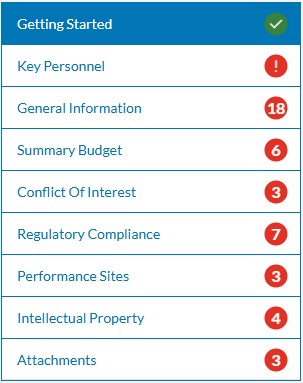
The Cayuse SP module has a built-in/customized routing protocol that, based on how questions are answered in SP, creates a schedule of email notifications and review/approval requests.
The “Route for Review” button is inactive until the PI has completed all of the sections in Cayuse SP.

Cayuse SP has a series of sections on the left-hand side of the screen. In each section are questions related to the section topic.
The RED circle indicates that the section is not yet completed and the number in the circle indicates how many questions remain to be answered.
When all questions have been answered in a section a GREEN circle with a checkmark will display.
When each section has a green checkmark, the “Route for Review” button is activated, and the PI can begin the internal routing/review process.
The routing routine begins by first sending an email request to the PI to certify that the information provided is accurate. Then based on the college/school selected and answers to compliance questions, the routing and notification chain is created:
The general routing chain:
At each step in the review and approval process the proposal is on hold until the sequential designated faculty completes their review and approves the proposal. (Example: cannot route from PI to Dean or PI to Provost)
If the proposal approval is declined by any internal reviewer during this phase, the Cayuse administrator is notified to take the necessary steps to move the proposal back into the development stage (so the PI can address any issues and try re-routing), OR if the proposal is declined, it is marked as closed and remains in the PI’s portal for future reference.
By following these steps and understanding the critical role of the AOR, researchers can navigate the federal grant submission process more effectively.
Ann Serra, Dir. OSPRA
serraam@udmercy.edu
(313) 993-1469
CAYUSE, GrantForward & CITI Programs Support
Michele Favoretto
favoremi@udmercy.edu
(313) 993-1428
Required Forms/Templates

Working with OSPRA from project concept through award has significantly increased my awareness and understanding of the processes and UDM policies.
OSPRA offers a series of workshops throughout the academic year. Browse the workshop schedule and register today.
OSPRA Workshops offer the perfect opportunity to lean more about the sponsored research activities at UDM and gain an understanding of the process and policies. Register today.